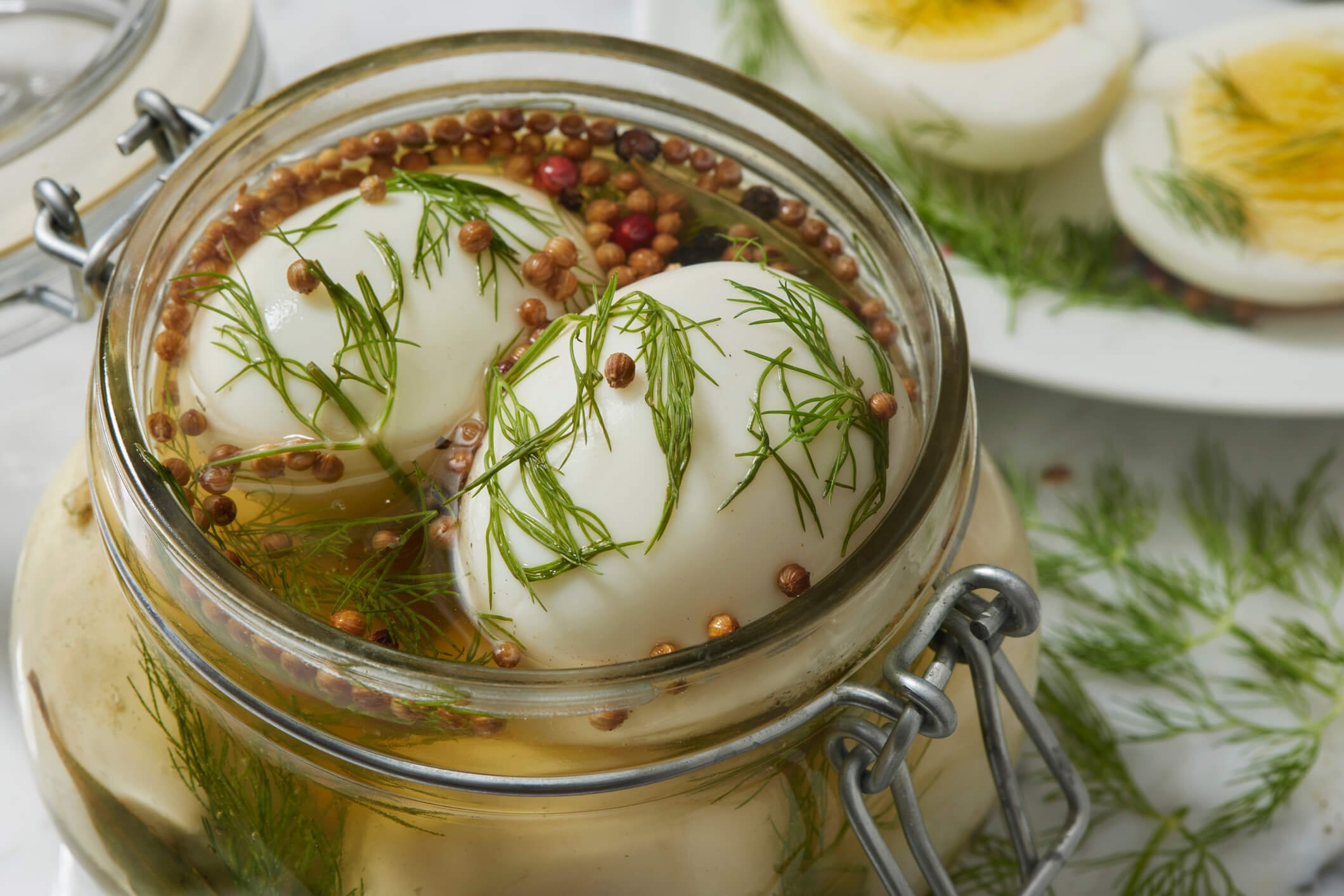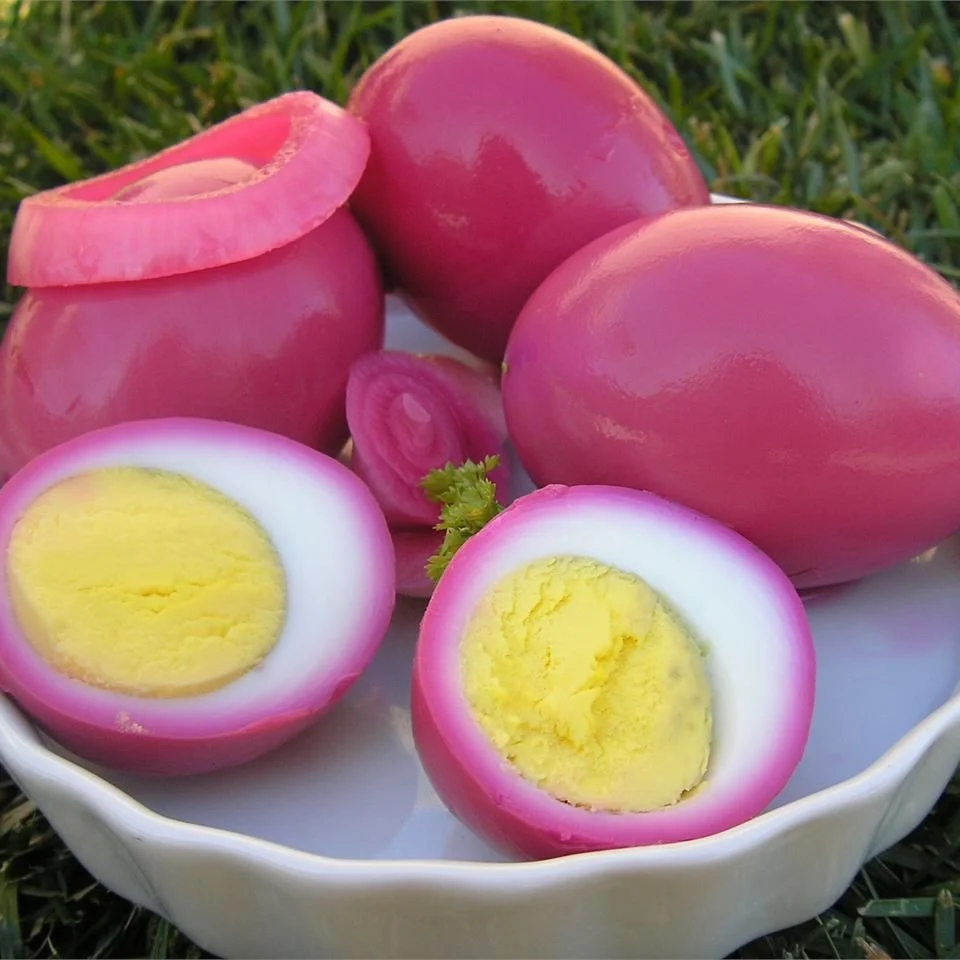Pickling Eggs
A Comprehensive Guide to Flavorful Preservation
Discover > Texas Home Cooking > Pickling > Pickling Eggs
Pickling eggs is a time-honored technique that has stood the test of time, transforming a simple, hard-boiled egg into a tangy, savory treat. In this exploration of old-fashioned pickled eggs, uncover the culinary secrets and tried-and-true recipes that make you a pickling egg master.
Discover the simplicity and worthiness of the process, where hard-boiled eggs immersed in vinegar, herbs, spices, and flavorful ingredients create delightful snacks, appetizers, or side dishes – both visually appealing and flavorful.
Delve into diverse pickling methods, history, and regional variations, whether you're a seasoned pro or a curious novice. Expand your knowledge and experiment in your kitchen with the captivating world of pickled eggs.
Understanding Pickling
Pickling preserves food by immersing it in a brine of vinegar, water, salt, sugar (how long does sugar last?), and spices. Vinegar's acidity and salt thwart harmful bacteria growth, ensuring preservation. To prepare, mix vinegar, water, sugar, salt, and seasonings. Bring to a boil the pickling liquid mixture, then simmer briefly to meld flavors. Pour the heated brine over food, e.g., hard-cooked, peeled eggs, using small or medium eggs for thorough seasoning.
For effective pickling, vinegar with 5% acidity is crucial. White vinegar's neutrality lets other seasonings shine, though diverse vinegars offer unique flavors. Maintaining the vinegar-to-water ratio matters—usually 1:1, adjusting as needed. Too little vinegar under preserves, while excess yields excessive acidity.
Sugar and salt are essential to pickling, carefully measured. Sugar balances vinegar's sourness and acts as a preservative. Salt aids preservation and enriches flavor.
Pickling maintains food's nutrition and extends its shelf life. Duration varies; three days in the fridge is a common recommendation. Resulting pickled eggs are a versatile, savory snack suitable for various culinary uses.
Ingredients for Pickling Eggs
To pickle eggs, start with core ingredients: hard-boiled eggs, vinegar, salt, and sugar. Customize with extras like pickling spice (how long does pickling spice last?), garlic, onion, beets, or jalapeños for complexity.
Begin with a dozen hard-boiled eggs cooled to room temperature. Peel them before pickling for better flavor absorption.
Vinegar choice impacts taste. White vinegar is common for neutrality; apple cider vinegar (how long does apple cider vinegar last?) offers mild sweetness.
Salt and sugar preserve and flavor. Adjust to taste.
Enhance flavor with extras: pickling spice with cloves (how long do cloves last?), mustard, coriander; garlic, onions, or fresh dill.
For unique hue and taste, beet juice colors eggs pink. Jalapeños add heat.
Combine all ingredients, bring brine to boil, then cool. Pour over eggs in a mason jar. Refrigerate, marinating for days.
Experiment for personal taste. Enjoy the journey of pickling with balanced flavors.
Recipes
In this section, we provide three popular pickled egg recipes, each with a unique flavor profile. Let's dive into these delectable recipes.
Basic Pickled Egg Recipe
For a simple, classic recipe, we'll start with the Basic Pickled Eggs. Here's what you need to do:
In a saucepan, combine equal parts vinegar and water, along with a generous pinch of salt, and 1-2 tablespoons of granulated sugar.
Bring the mixture to a boil, then let it cool to room temperature.
Place your hard-boiled eggs in a jar, along with a few dill sprigs for added flavor.
Pour the cooled brine over the eggs, making sure they are completely submerged.
Seal the jar and refrigerate for at least 48 hours before enjoying your pickled eggs.
Beet Pickled Eggs Recipe
If you prefer a visually stunning and tangy twist on pickled eggs, try the Beet Pickled Eggs recipe. Follow these steps:
Boil together a mixture of vinegar, water, sugar, pickling spice, and salt, as described in the Basic Pickled Eggs Recipe.
Add a can of sliced beets and their juice to the saucepan, allowing the flavors to meld for a few minutes.
Pack your jar with hard-boiled eggs, beets, and some sliced red onion for an additional pop of color.
Pour the beet-infused brine over your eggs, ensuring they are fully covered.
Cover the jar and keep it in the refrigerator for at least 3 days before consuming.
Spicy Pickled Eggs Recipe
For a fiery and flavorful take on pickled eggs, give the Spicy Pickled Eggs recipe a try. Here's how:
Follow the steps outlined in the Basic Pickled Eggs Recipe to boil a mixture of vinegar, water, sugar, pickling spice, and salt.
Infuse some heat by adding sliced jalapeños to the saucepan, letting the flavors meld for a few minutes.
Arrange hard-boiled eggs in a jar along with the jalapeños for an extra kick.
Pour the spicy brine over the eggs, ensuring they are completely submerged.
Seal the jar and place it in the refrigerator for at least 3 days before enjoying the zesty results.
Refrigeration and Storage
When storing pickled eggs, it is crucial to maintain proper refrigeration to ensure their safety and freshness. We recommend keeping pickled eggs in a glass mason jar filled with brine and stored in your refrigerator at or below 39°F. This helps to mitigate the risk of bacterial infection, which becomes more prevalent at temperatures of 40°F or above.
While canning may be a popular preservation method for some foods, it is not recommended for pickled eggs. Instead, they should be stored solely in the refrigerator. During serving time, pickled eggs can be left at room temperature, but they should not be exposed to temperatures between 40°F and 140°F for more than two hours, according to the National Center for Home Food Preservation.
We cannot stress enough the importance of proper storage, as home pickled eggs stored at room temperature have been linked to cases of botulism. Storing pickled eggs in an airtight container and following these guidelines can help prevent such issues and ensure their safe consumption.
In summary, always store pickled eggs in a glass mason jar, fully submerged in brine, and placed in the fridge. When serving, limit their exposure to room temperature to no more than two hours. By following these storage and refrigeration tips, your pickled eggs can be enjoyed both safely and deliciously.
Serving Suggestions
Pickled eggs are a versatile treat, ideal for various dishes and as a standalone snack. Discover some favorite ways to savor these flavorful gems - whether on their own, as salad enhancements, or paired with bread and butter pickles.
Quick and Easy Snack
For a convenient snack, serve pickled eggs with a sprinkle of paprika or preferred seasoning. Arrange them on a platter or cutting board alongside other pickled delights like bread and butter pickles, olives, and pickled onions.
Elevating Salads
Elevate salads (What wine goes well with salads?) with pickled egg charm. Slice or quarter eggs, adding them to a mix of greens, cucumber, cherry tomatoes, and crumbled feta cheese. The tangy notes of pickled eggs enhance the salad's vibrancy and taste.
Sweet Meets Savory
Pair pickled eggs with classic bread and butter pickles for a unique fusion. The sweetness of the pickles contrasts wonderfully with the eggs' savory-sour profile. Showcase them on a charcuterie (What wine goes well with charcuterie?) board alongside cheeses, meats, and crusty bread for a satisfying medley.
Sandwich Elevation
Elevate sandwiches with sliced pickled eggs. They beautifully complement cucumber, cream cheese, and smoked salmon in bagels (how long do bagels last?) or rye bread. Alternatively, layer them on turkey or ham sandwiches for added crunch and flavor.
Remember, these are merely a few suggestions among myriad ways to relish pickled eggs. Experiment with your favorite ingredients and flavors to compose your own egg salad masterpiece.
Safety Precautions
When it comes to pickling eggs, there are several important safety precautions we need to keep in mind to ensure that our tasty treats are preserved properly and remain safe to consume.
Safe Pickling
Always adhere to the National Center for Home Food Preservation's guidelines when pickling. These guidelines ensure safe handling of eggs and the pickling solution, reducing contamination and spoilage risks.
Botulism Alert
Botulism, a severe food poisoning, is a concern in pickled eggs due to low-oxygen sealed jars. To mitigate the risk, thoroughly prepare ingredients and equipment. Wash, cook, and clean with care to prevent contamination.
Clean Environment
Maintain cleanliness during pickling for proper preservation. Sanitize tools, surfaces, and hands to minimize bacteria introduction and egg spoilage.
Temperature Control
Store sealed jars in a cold environment below 40°F (4°C). Refrigeration slows bacterial growth, sustaining egg quality and flavor.
Nutritional Information
Pickled eggs are a popular snack with nutritional benefits. A large pickled egg contains about 72 calories, offering 6.3g protein, 4.97g fat, and around 0.53g carbohydrates.
They also provide essential minerals and vitamins. Each large pickled egg has 198mg cholesterol and 131mg sodium, though sodium intake varies based on brine ingredients. Pickled eggs contain minor amounts of calcium (10mg) and vitamin D (1.1mcg), varying by recipe.
With diverse flavor options, pickled eggs' nutritional profiles may differ, particularly in sodium, sugar, and spice levels. In essence, they're a balanced, low-calorie snack rich in protein and fat, suitable for satisfying and nutritious eating. Customizing recipes lets us tailor nutritional content to our dietary preferences.
Frequently Asked Questions
How to pickle eggs without refrigeration?
Pickled eggs can be stored without refrigeration if they are properly preserved in vinegar solution. To pickle eggs without refrigeration, simply follow a tested pickling recipe and store the jars at room temperature, away from direct sunlight. However, once the jar is opened, it's necessary to refrigerate the remaining pickled eggs to keep them safe for consumption.
Southern pickled eggs recipe?
A popular Southern pickled eggs recipe includes the use of vinegar, sugar, red beet juice, black pepper, cinnamon, and cloves. The eggs are first hard-boiled, cooled, and peeled. Then, the pickling solution is prepared by heating the vinegar, sugar, beet juice, and spices to dissolve the sugar. Finally, the peeled eggs are placed in a jar along with the pickling solution and allowed to sit for a few days to allow the flavors to develop. For a more detailed recipe, visit A Family Feast.
Canning pickled eggs: is it safe?
Canning pickled eggs is not recommended as there are no scientifically-tested methods to safely can them at home. The risk of botulism makes it unsafe to store pickled eggs at room temperature for an extended period. It is best to store prepared pickled eggs in the refrigerator, where they can last for several weeks.
Best pickling spices for eggs?
The best pickling spices for eggs can vary depending on personal preference. Common choices include black pepper, mustard seeds (how long do mustard seeds last?), dill seeds (how long do dill seeds last?), coriander, cloves, allspice, cinnamon, bay leaves, and red pepper flakes. Feel free to experiment with different spice combinations to find your favorite flavor profile for pickled eggs.
How long does it take for eggs to be pickled?
The pickling process for eggs usually takes a few days for flavors to develop. It’s generally recommended to leave the eggs in the pickling solution for a minimum of 3 to 4 days. But for more robust flavors, you can leave the eggs in the pickling solution for up to 2 weeks.
Are pickled eggs good for you?
Pickled eggs can be a healthy snack if consumed in moderation. They retain the nutritional benefits of hard-boiled eggs while adding the tangy flavor of the pickling solution. Just be mindful of the potential added sugar and sodium content from the pickling process. For more information on the health benefits of pickled eggs, check Food For Net.



